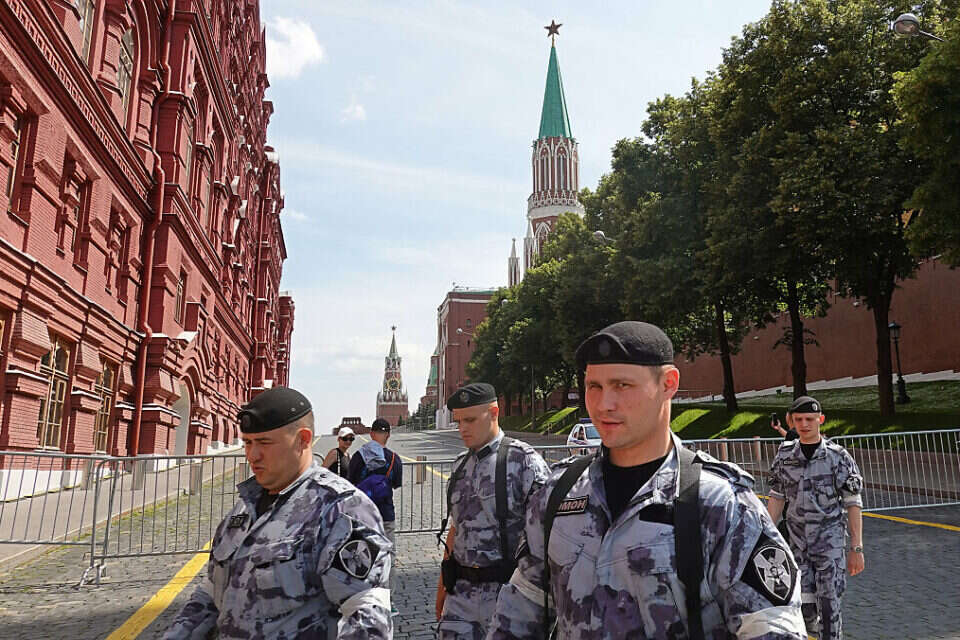By the morning of the next day, Moscow was almost completely back to normal. Although the state of counterterrorism emergency has not yet been lifted, nothing mentioned the checkpoints at the southern entrances to the city over the weekend. Other parts of Moscow, including the city center, didn't even seem to notice that something had happened.
It should be said that even over the weekend itself, while the entire country waited for battles between Wagner's forces and the Department of Defense, ordinary people did not feel increased security – even around strategic facilities, which could have been targets of attack. There were no extensive searches of metro stations or public places, and there was no increase in the number of people in uniform on the streets. Moreover, the Internet and cellular networks operated in the center, which does not happen even in regular demonstrations.
"Groups of men in suits and uniforms did not convey concern." Moscow, Photo: AP
In the morning, the compound of the Ministry of Defense buildings was also not surrounded by security forces. On the street, one military police car was patrolled, along with a police minivan and another vehicle covered in khaki and without identification marks. The area beyond the fence looks almost deserted. Two or three groups of men in suits and uniforms conveyed no concern.
Next to each of the checkpoints stood 6-3 security guards armed with rifles, vests and helmets. My interlocutors there, who are more involved in the work of the Ministry of Defense, could not say whether this was an enlarged monument compared to normal times. One of the soldiers near the checkpoints saw that I was filming, said it was forbidden and ordered it deleted. I asked if this was also required in normal times, but he refused to answer.
A similar atmosphere prevailed in the area of the old square, where the presidential headquarters and the headquarters of the PSB (the Russian Shin Bet) are located. Only a few people in police uniforms were standing around the building and two patrol cars with chkalakas. The only thing that caught my eye was the unusual amount of cars with government license plates parked in the alleyways.
Mobile car on Red Square, Moscow,
In general, at first glance, Moscow residents broadcast business as usual on Saturday: strolled in parks, sat in cafes. Perhaps only their number was smaller than on a perfectly ordinary Saturday afternoon. At the same time, several cultural institutions and shopping malls were closed – under various explanations.
The Kremlin's museums, for example, announced on Friday that they would not accept audiences. On Saturday, visits to the Tretyakov Gallery, the Pushkin Museum, the GES-2 House of Culture, Gorky Park and Sokolniki Park were stopped. Suddenly, in the middle of the day, they announced the evacuation of visitors – in some cases for "technical reasons", in other cases because of bomb announcements. Mass events, such as proms, have also been canceled.
Unlike the city center, it was much more tense on its southern outskirts - in an area where the ring road surrounding Moscow connects to the highways from which Prigozhin's forces could reach. The networks were filled with reports of the installation of machine guns in the Yasenbu area and the erection of sandbag barricades. Navigation services also found it difficult to direct to the ring road, even though no unusual congestion was observed.
"Broadcast business as usual," citizens strolling through gardens near the Kremlin,
On two other highways, from which Tori Wagner could reach, stood long convoys of orange dirt trucks, filled with sand. They were supposed to prevent Wagner's armored personnel carriers from breaking in. More trucks were waiting for their time on each side of the ring road.
What also made it clear that something was happening was that on the Warsaw road they set up a mobile military hospital with a tent, a food reservoir, a field kitchen and chemical toilets. A police car and a truck with soldiers were waiting anxiously. From the sidelines, it appears that there were at most twenty fighters there – nothing compared to the numbers of police and National Guardsmen who filled Russia's streets and squares during the opposition protests before the war.
But a few hundred meters from the ring road, Muscovites were strolling like the other day: I didn't notice panic. It should be said that overall the security measures were minimal compared to those taken, for example, against the protest demonstrations in the previous decade: it seems that the authorities do not really intend to stop Prigozhin's journey.
Wagner's forces pass roadblocks on the way to Moscow \\ Credit: Social networks
Strangely, when the commander of Wagner's forces declared that "in order to prevent bloodshed" he was returning his forces to the camps, there was an increase in security measures. Armed and well-protected reinforcements were brought to the junction between the road coming from Rostov and the Ring Road, and the area around the interchange was closed. But all this did not last more than half an hour: the police seemed to fade into thin air.
Meanwhile, Muscovites shared their feelings on social media, and it seems that the events have caused a strange elation among most of them - field reporters described the extra shift, and users posted "memes" and jokes.
Among the Russian citizens who oppose the war is Prigozhin's reputation on the floor, but when his journey ended, many, doubtful jokingly, said they were disappointed. Perhaps the end of the Prigozhian raid signaled: a return to the blinkered routine of wartime.
Wrong? We'll fix it! If you find a mistake in the article, please share with us

